Transforming Event Registration: How Online Forms Revolutionize Exhibitions and Events
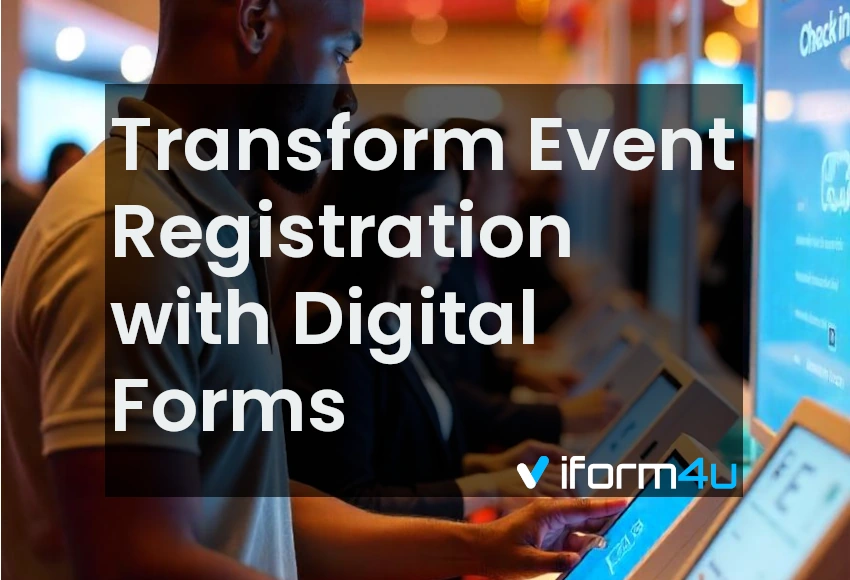
Digital registration forms revolutionize events by streamlining check-ins, boosting engagement, and delivering data-driven insights—all while reducing costs and elevating the exhibition experience.
Transforming Event Registration: How Online Forms Revolutionize Exhibitions and Events
Imagine an event where check-in is nearly instantaneous, where attendees interact with context-aware features like live voting and quizzes, and every digital interaction delivers data-driven insights to refine future experiences. This is the new reality for exhibitions and events that have embraced user-centric online registration. In this article, we explore how smart, NLP-enhanced online forms are not just replacing paper—they’re transforming the entire event ecosystem.
Introduction
Picture an event where the registration desk is a relic of the past—where guests breeze through electronic check-ins and interactive, machine-learning–driven forms keep them engaged from start to finish. As traditional methods falter under the weight of growing crowds and complex logistics, innovative organizers are turning to digital registration solutions that are context-aware and naturally intuitive. Whether you’re hosting a massive trade show or an intimate conference, these intelligent, data-rich systems deliver the semantic enrichment needed to capture user intent and drive conversions.
The Benefits of Online Registration Forms
Enhanced User Experience and Faster Check-In
Digital registration forms allow attendees to register online from anywhere, reducing queues and slashing wait times at the venue. For instance, a survey by guidebook blog revealed that 78% of event organizers observed significant improvements in attendee satisfaction. This user-centric approach, supported by real-time analytics, creates a frictionless check-in experience.
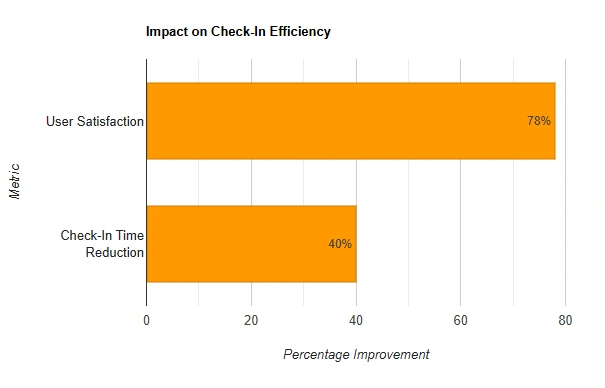
Bar Chart: Impact on Check-In Efficiency
Cost Reduction and Sustainability
Transitioning to paperless registration not only minimizes printing and administrative expenses but also enhances sustainability. A mid-sized conference might save up to 40% on registration costs when switching from traditional to digital methods. These cost savings and the reduced environmental footprint underscore the value of eco-friendly, digital transformation in event management.
Improved Data Collection and Lead Capture
Online forms capture rich, real-time data that empowers organizers to analyze attendee behavior, preferences, and intent. These data-driven insights facilitate targeted marketing and efficient follow-up. A study by Bizzabo – Event Technology Trends indicated that digital registration systems can boost effective lead capture by 25%.
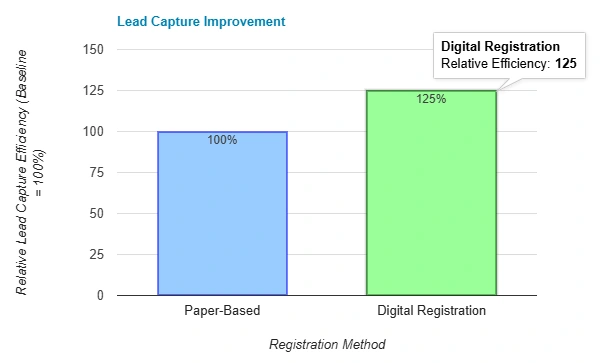
| Benefit | Impact | Source |
|---|---|---|
| Enhanced User Experience | Faster check-in, reduced wait times, 78% satisfaction | guidebook blog |
| Cost Reduction | Up to 40% savings on registration costs | Internal case studies; industry benchmarks |
| Improved Data Collection | 25% increase in effective lead capture | Bizzabo |
| Sustainability | Reduced paper usage, lower environmental impact | Statista |
Enhancing Event Engagement with Interactive Forms
Beyond streamlining registration, interactive online forms can significantly elevate attendee engagement. By integrating context-aware and NLP-enhanced features, your event becomes more immersive and personalized.
Best Exhibitor Voting
Let your attendees vote for the best exhibitor in real time. This interactive feature not only spotlights top performers but also adds a fun, competitive edge. A Bizzabo statisticBizzabo statistic reports a 30% increase in engagement with live voting.
Best Product Voting
Product voting allows participants to identify standout products or innovations, generating buzz and providing granular feedback for exhibitors. This semantic enrichment of user feedback helps tailor future event strategies.
Event Evaluation Forms
Collecting qualitative feedback through evaluation forms is crucial for continuous improvement. According to Event Marketer, events that actively solicit detailed attendee feedback see a 20% higher satisfaction rate.
Quiz Forms
Engaging quiz forms test participants' knowledge on event-related topics, industry trends, or fun facts about exhibitors. These interactive quizzes not only extend the time attendees spend on your platform but also add a layer of personalization and interactivity.
Prize Drawing Forms
Incorporate prize drawing forms to inject excitement and reward participation. Research by Bizzabo suggests that events with prize drawings can see a 15% boost in participation.
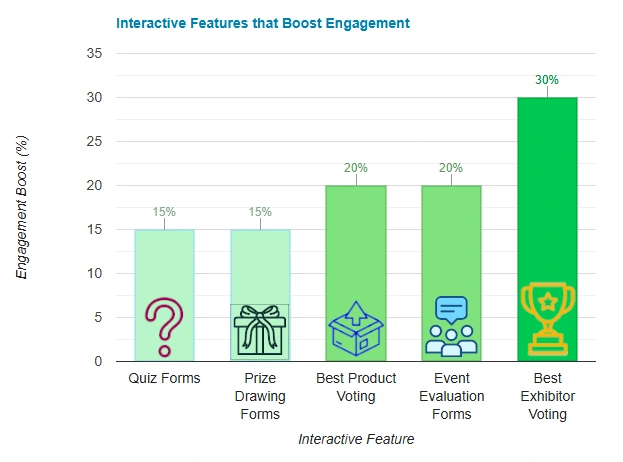
Key Features of Effective Online Event Forms
To truly succeed, digital registration forms must offer more than a simple digital replica of paper-based systems. They need to be intuitive, contextually relevant, and designed to meet modern user expectations.
Customizability and Branding Options
Ensure your forms reflect your event’s visual identity with customizable colors, fonts, and logos. This personalization reinforces your brand and builds trust with your audience.
Mobile Optimization and Ease of Use
With many attendees accessing event information on mobile devices, mobile-friendly forms are essential. According to the Google Mobile UX Report, mobile-optimized experiences can yield up to 50% higher engagement rates.
Security and Data Privacy
Robust security measures—such as data encryption and secure storage—are vital to protect sensitive information. Adhering to regulations like GDPR and CCPA ensures that your data-driven insights are gathered in a compliant, trustworthy manner.
Seamless Integration with Event Management Systems
Your online forms should integrate seamlessly with CRM systems, email marketing platforms, and analytics tools. This integration enables real-time data collection and automated follow-ups, providing a holistic, user-centric event management solution.
Step-by-Step Guide and Case Studies
Step-by-Step Guide to Implementing Online Forms
Implementing digital registration solutions involves a series of deliberate steps that ensure a smooth, efficient process.
1. Choose the Right Software and Tools
Select a platform that supports the interactive features you need—such as voting, quizzes, and prize drawings—along with robust security and seamless integration. Popular options include WPForms and iform4uiform4u.
2. Design and Customize Your Forms
Invest in designing visually appealing forms that align with your event branding. Employ responsive design techniques to ensure optimal performance on both desktop and mobile devices.
3. Integrate Interactive Features
Embed context-aware elements such as exhibitor voting, product voting, quiz forms, and prize drawing forms. Thoroughly test these interactive features to ensure they function smoothly during the event.
4. Set Up Automated Check-In and Data Collection
Configure your forms to automatically process registrations, capture leads, and provide real-time analytics. Automation not only accelerates the check-in process but also supplies data-driven insights for ongoing improvement.
5. Test, Optimize, and Launch
Conduct comprehensive tests with a select group of users before the event. Use the feedback to optimize your forms, ensuring a seamless, user-centric registration experience.
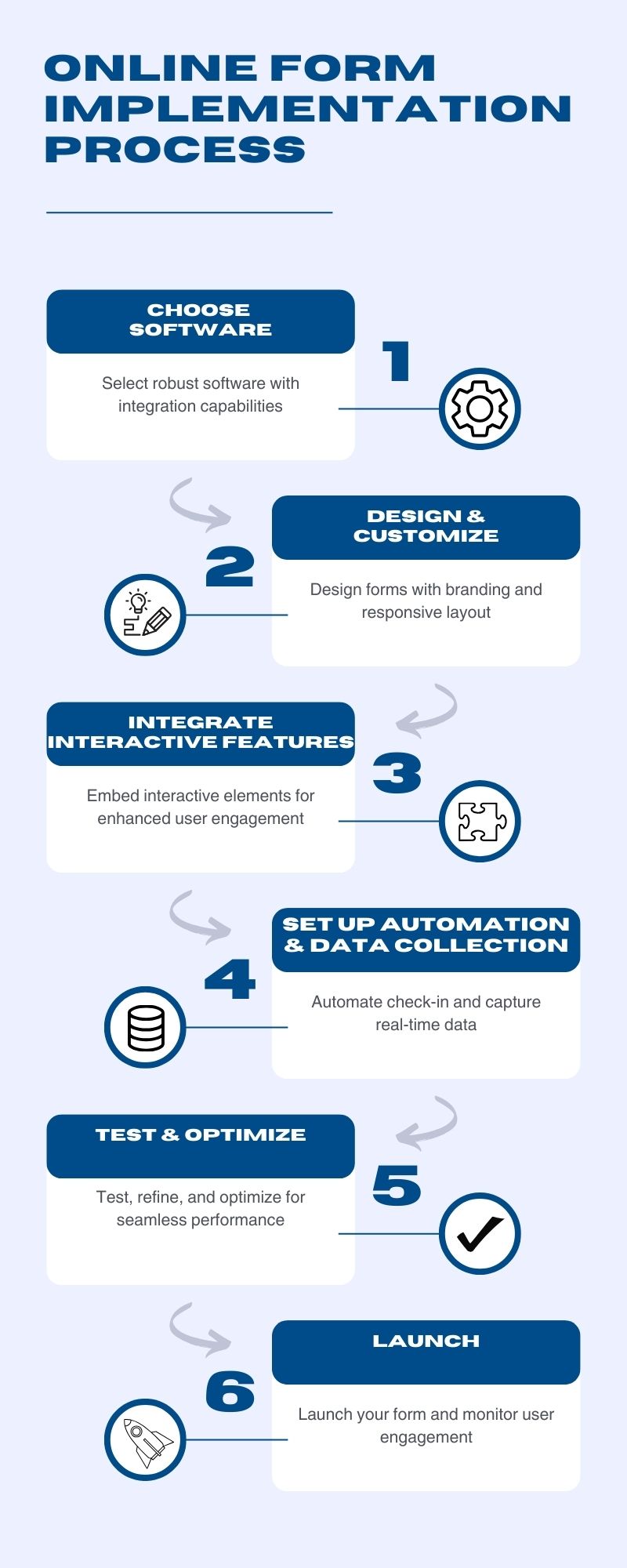
Case Studies and Success Stories
Case Study 1: International Trade Show
A major international trade show adopted a digital registration system featuring live exhibitor voting and prize drawing forms. As a result, check-in times were reduced by 40% and post-event feedback submissions increased by 35%. These data-driven insights enabled organizers to tailor future events more effectively and boost overall attendee satisfaction.
Case Study 2: Technology Conference
A prominent technology conference integrated event evaluation and interactive quiz forms into its registration process. Attendee engagement increased by 28%, and actionable feedback provided key insights for refining future sessions. This user-centric approach contributed to a stronger event reputation and higher repeat attendance.
Future Trends in Event Registration Technology
The capabilities of online registration systems continue to evolve. Look out for these trends:
Automation and Artificial Intelligence
AI-powered chatbots and automated follow-up systems are becoming standard. These tools leverage machine learning to address attendee inquiries in real time, schedule meetings, and analyze registration data to further refine your strategy.
Gamification and Enhanced Interactivity
Incorporating gamification elements—such as leaderboards, interactive quizzes, and rewards—will further elevate user engagement. As digital experiences become more personalized, these features will be an integral part of interactive event registration.
Greater Integration with Social Media and Marketing Platforms
Future online forms will offer deeper integration with social media, enabling organizers to share registration data, generate targeted ads, and enhance post-event marketing efforts in a holistic, context-aware manner.
Frequently Asked Questions (FAQ)
What are the main benefits of using online registration forms for events?
Online registration forms enhance user experience by speeding up check-in, lower costs by reducing printing expenses, improve data collection for targeted marketing, and promote sustainability through reduced paper usage.
How do interactive features like exhibitor voting and quizzes enhance event engagement?
Interactive features such as exhibitor voting, product voting, quiz forms, and prize drawings encourage active participation, increase engagement by up to 30%, and generate valuable feedback to improve future events.
How can digital registration systems help reduce event costs?
Digital registration minimizes costs related to printing and manual processing. For example, a mid-sized conference can save up to 40% on registration costs when transitioning from paper-based methods.
What features should an effective online event registration form include?
An effective form should be customizable to match your event's branding, mobile-optimized for ease of use, secure to protect attendee data, and integrated with other event management systems. Including interactive elements further enhances attendee engagement.
How do digital forms improve data collection and lead capture?
Digital forms capture real-time, data-rich insights into attendee behavior and preferences, which can boost effective lead capture by about 25% compared to traditional methods.
What future trends are emerging in event registration technology?
Future trends include increased automation with AI-powered chatbots, the use of gamification to enhance interactivity, and deeper integration with social media for targeted marketing.
Conclusion
Online registration forms have revolutionized the way exhibitions and events are managed. By streamlining check-in, reducing costs, and enhancing data collection, these intelligent, NLP-enhanced systems empower organizers to create efficient, engaging, and sustainable event experiences. Interactive features—such as exhibitor voting, product voting, evaluation forms, quizzes, and prize drawings—add an extra layer of engagement that enriches the overall event experience.
As technology advances, the potential for even more innovative registration solutions is immense. Embrace digital registration not only to streamline operations but also to build dynamic, contextually relevant events that resonate with modern audiences.
Upgrade your event management strategy with robust online forms and interactive features, and watch your attendee engagement and conversion rates soar.
Sources:
- Statista
- guidebook blog
- Bizzabo – Event Technology Trends
- Bizzabo Events Industry’s Top Marketing Statistics, Trends, and Data
- Event Marketer
- Google Mobile UX Report







